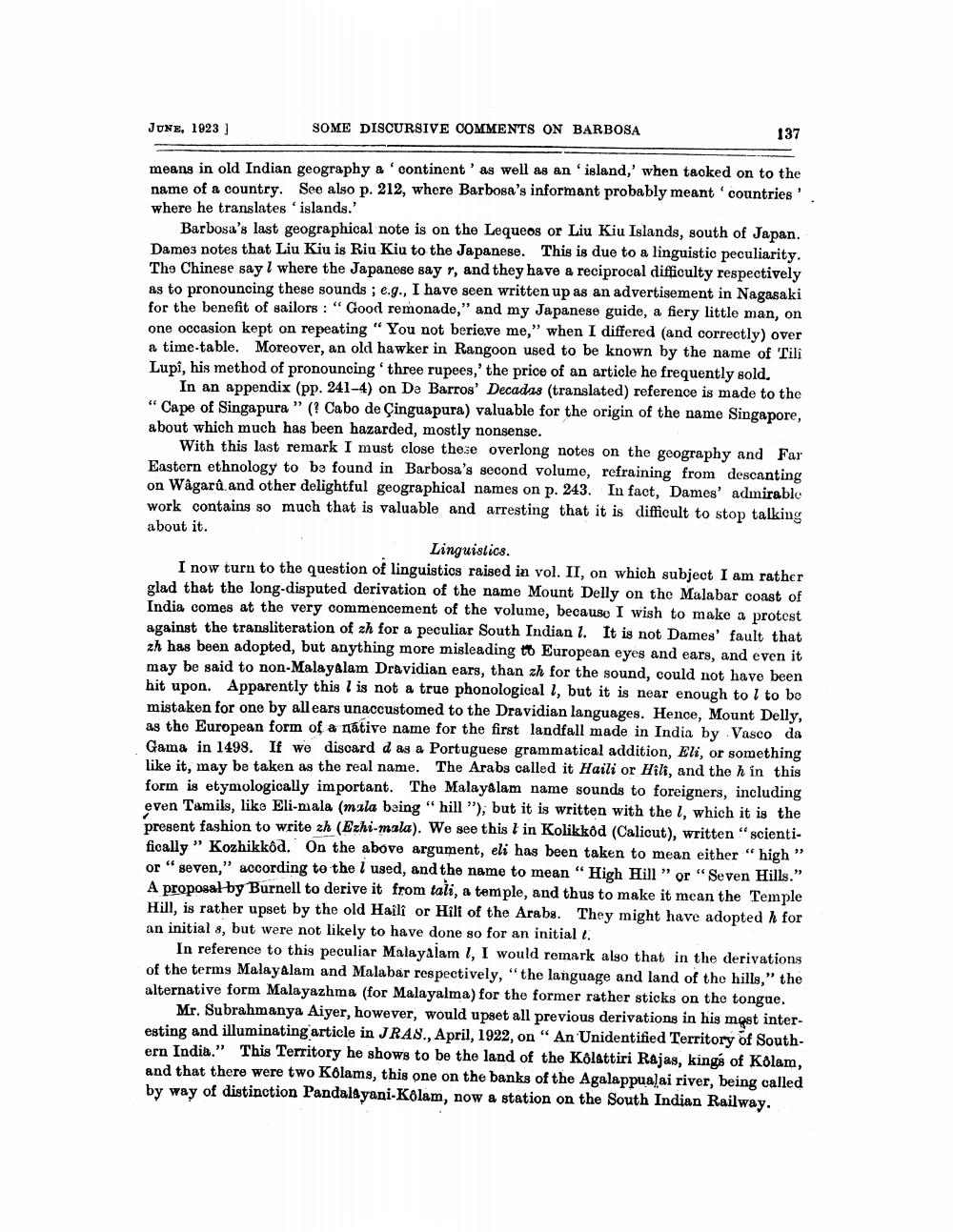________________
JUNE, 1923]
SOME DISCURSIVE COMMENTS ON BARBOSA
137
means in old Indian geography a 'continent' as well as an 'island,' when taoked on to the name of a country. See also p. 212, where Barbosa's informant probably meant countries' where he translates islands.
Barbosa's last geographical note is on the Lequeos or Liu Kiu Islands, south of Japan. Dames notes that Liu Kiu is Riu Kiu to the Japanese. This is due to a linguistic peculiarity. The Chinese say I where the Japanese say r, and they have a reciprocal difficulty respectively as to pronouncing these sounds; e.g., I have seen written up as an advertisement in Nagasaki for the benefit of sailors : "Good remonade," and my Japanese guide, a fiery little man, on one occasion kept on repeating “You not berieve me," when I differed and correctly) over a time-table. Moreover, an old hawker in Rangoon used to be known by the name of Tili Lupi, his method of pronouncing' three rupees,' the price of an article he frequently sold.
In an appendix (pp. 241-4) on De Barros' Decadas (translated) reference is made to the “Cape of Singapura” (? Cabo de Çinguapura) valuable for the origin of the name Singapore, about which much has been hazarded, mostly nonsense.
With this last remark I must close these overlong notes on the geography and Far Eastern ethnology to be found in Barbosa's second volume, refraining from descanting on Wågarû and other delightful geographical names on p. 243. In fact, Dames' admirable work contains so much that is valuable and arresting that it is difficult to stop talking about it.
Linguistics. I now turn to the question of linguistics raised in vol. II, on which subject I am rather glad that the long-disputed derivation of the name Mount Delly on the Malabar coast of India comes at the very commencement of the volume, because I wish to make a protest against the transliteration of ch for a peculiar South Indian l. It is not Dames' fault that zh has been adopted, but anything more misleading to European eyes and ears, and even it may be said to non-Malayalam Dravidian ears, than zh for the sound, could not have been hit upon. Apparently this l is not a true phonological l, but it is near enough to 1 to be mistaken for one by all ears unaccustomed to the Dravidian languages. Hence, Mount Delly, as the European form of a native name for the first landfall made in India by Vasco da Gama in 1498. If we discard d as a Portuguese grammatical addition, Eli, or something like it, may be taken as the real name. The Arabs called it Haili or Hili, and the h in this form is etymologically important. The Malayalam name sounds to foreigners, including even Tamils, like Eli-mala (mula being "hill”), but it is written with the l, which it is the present fashion to write zh (Ezhi-mala). We see this l in Kolikkod (Calicut), written "scientifically " Kozhikkoa. On the above argument, eli has been taken to mean either "high" or geven.” zooording to the lused, and the name to mean "High Hill" or "Seven Hills." A proposal by Burnell to derive it from tali, a temple, and thus to make it mean the Temple Hill, is rather upset by the old Hailî or Hill of the Arabs. They might have adopted h for an initial 8, but were not likely to have done so for an initial t.
In reference to this peculiar Malayalam I, I would remark also that in the derivations of the terms Malayalam and Malabar respectively, "the language and land of the hills," the alternative form Malayazhma (for Malayalma) for the former rather sticks on the tongue.
Mr. Subrahmanya Aiyer, however, would upset all previous derivations in his most interesting and illuminating article in JRAS., April, 1922, on “An Unidentified Territory of Southern India." This Territory he shows to be the land of the Kolattiri Rajas, kings of Kolam, and that there were two Kolams, this one on the banks of the Agalappua!ai river, being called by way of distinction Pandala yani-Kolam, now a station on the South Indian Railway.




